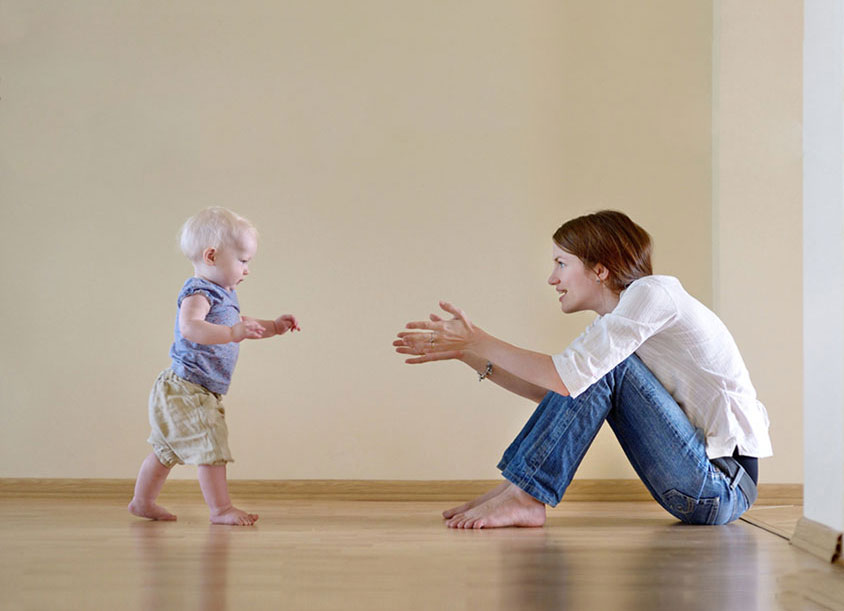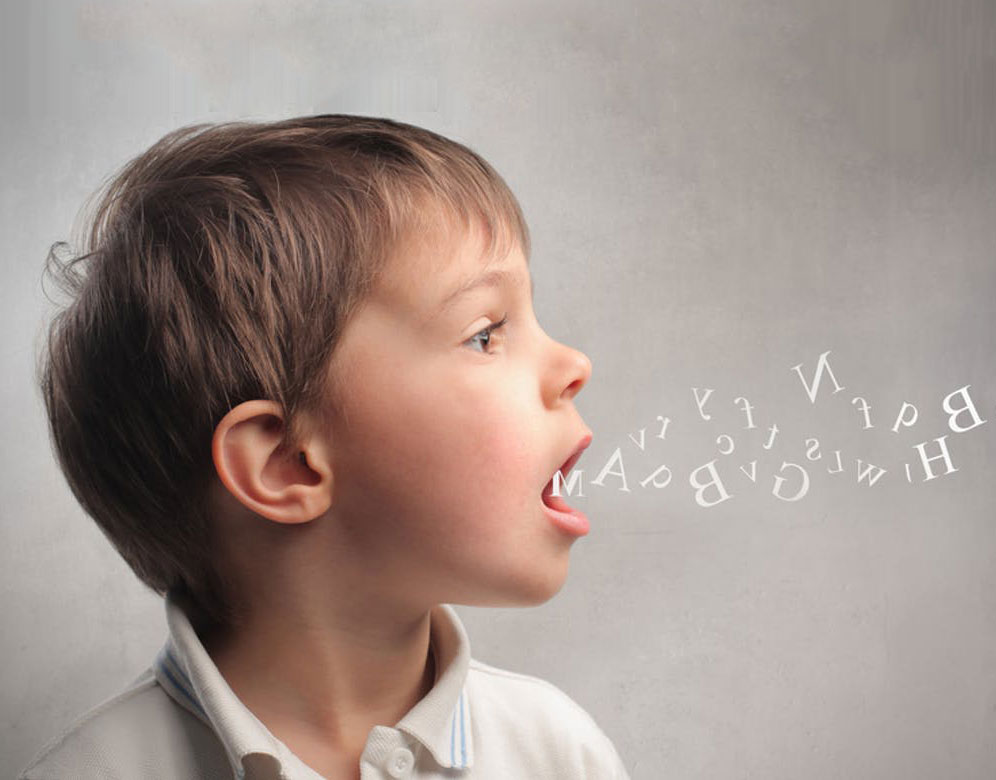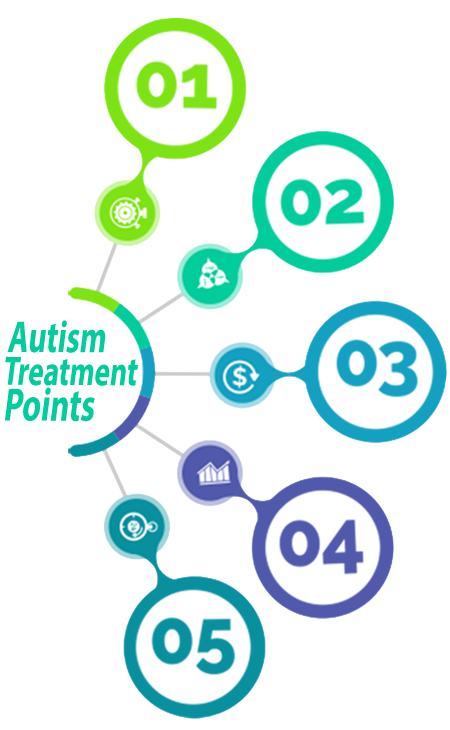
What Is Autism?
Autism is a lifelong neurological and developmental disorder that affects early in childhood and affects daily functioning. Autism spectrum disorder, characterized by wide variation in challenges with social skills, repetitive behaviors, speech, nonverbal communication, and strengths possessed by each person with autism. The causes of ASD are not known. Research suggests combinations of genetic and environmental influences both play important roles. So its always better to take care of preventive measures.
Some of the behaviors associated with autism include delayed learning of language; difficulty making eye contact or making a conversation; difficulty with executive functioning, which relates to reasoning and planning; narrow, intense interests; poor motor skills’ and sensory sensitivities. A diagnosis of ASD includes an assessment of intellectual disability and language impairment. At the time of your child development check up, if your health care provider finds any signs of ASD, your child will have a comprehensive evaluation. It may include a team of specialists, doing various tests and evaluations to make a diagnosis.
Signs And Symptoms of ASD
Social Challenges And Social Understanding
Most children who develop autism have difficulty engaging in the give-and-take interactions with others. By 8 to 10 months of age, many who go on to develop autism are showing some symptoms such as failure to respond to their names, reduced interest in people and delayed babbling. Symptoms may include:
- Unusual or inappropriate body language, gestures, and facial expressions
- Lack of interest in other people or in sharing interests or achievements
- Resistance to being touched
- Difficulty or failure to make friends with children the same age.
- Unusual in social interaction; comes across as aloof and detached; prefers to be alone.
- Difficulty understanding other people’s feelings, reactions, and nonverbal cues

Speech And Languages Difficulties

By age three, most children have passed predictable milestones on the path to learning a language. By the first birthday, most developing toddlers say a word or two, give a response when they hear their name, points the objects that they want.By contrast, young children with autism tend to be delayed in babbling and speaking and learning to use gestures. Autism Spectrum Disorder struggle with speech and language comprehension. Symptoms may include:
- Repeating words or phrases over and overTrouble starting a conversation or keeping it going.
- A problem in learning how to speak or doesn’t talk at all
- Speaking in an abnormal tone of voice, or with an odd rhythm or pitch
- Trouble starting a conversation or keeping it going
- Taking what is said too literally, missing humor, irony, and sarcasm.
- Difficulty communicating needs or desires
- Doesn’t understand simple statements or questions
Repetitive Behaviors And Play
Unusual repetitive behaviors include hand-flapping, rocking, jumping and twirling, and rearranging objects, and repeating sounds, words, or phrases another core symptom of autism. The habit to engage in a restricted range of activities can be seen in the way that many children with autism play with toys. Autism Spectrum Disorder is often restricted, rigid, and even obsessive in their behaviors, activities, and interests. Symptoms may include:
- Repetitive body movements
- Obsessive attachment to unusual objects like rubber bands, keys, light switches
- Gets upset by change in their routine or environment.
- Awkwardness, abnormal posture, or odd ways of moving
- Fascinated by spinning objects, moving pieces, or parts of toys
- reacts badly to certain sounds or textures, seeming indifference to temperature or pain.

Types of Autism
There are many levels on the autism spectrum, but these following are the most common types of autism that you might encounter.
Asperger's Syndrome
This is one of the milder types of autism spectrum disorder that you hear more and more. In many cases, kids who have Asperger’s syndrome are diagnosed much later, usually between the ages of five and nine. People with Asperger syndrome generally have above average language skills, but have a tough time with social interactions and have problems with communicating.
Symptoms:- problem in social interaction, unclear speech-language, unable to give proper facial expression, lack of understanding body language, obsessions, delay in skill development.
Rett Syndrome
Rett’s is a rare and relatively little-known type of autism, and it seems occurs almost exclusively in girls. It shows up at around six months of age and progress through the rest of the child’s life.These patients often have problems with muscle atrophy and do repetitive hand motions. They are almost always mentally dim to some degree.
Symptoms:- Sleep problems, breathing difficulties, a strange gait, teeth grinding, slowed growth, seizures, and a slowing of cognitive abilities.Between the ages of four and 10 years, the child begins a physical decline. In the final stages, the physical decline can be very severe.
Autistic Disorder
This type of spectrum can also be known as “classic” autism. It refers to problems with social and communication challenges, and unusual behaviors and interests. This is the most severe form of autism and also the most common. They do not like being touched by others, perform restricted or repetitive behaviors, experience sensory overload, and may have issues communicating.
Symptoms:- Failure to communicate, not meet eye contact, constant pitch level while talking, not responding to their name and repetition of particular behaviors.
Childhood Disintegrative Disorder
These children develop normally for at least two years and then lose some or most of their communication and social skills. This is an extremely rare disorder and its existence affect mental health problems.
Symptoms:- Most children with this syndrome development after the age of two, but they lose what they have learned after this period. Sudden changes in behavior, like agitation, or anger, which is followed by the loss of bowel or bladder control.
Asperger's Syndrome
It is also known as a typical autism. This diagnosis is provided to children who do not meet the full criteria for classic autism or Asperger’s syndrome. Delay in development including social development, communication, and the ability to use their imagination.
Symptoms:- Delay in development including social development, communication, and the ability to use their imagination. They may be confused about the surrounding people activities and have trouble understanding how it works.
Causes of Autism Spectrum Disorder
The theory that parental proceeding are responsible for ASD has long been disproved. Most cases involve a complex and variable combination of genetic risk and environmental factors that influence early brain development. ASD not only caused by genetics and environments
Genetics
For some children, autism spectrum disorder can be associated with a genetic disorder. The first is that something happens during fetal development that alters a gene and the second way is that the child inherits a problematic gene (or genes) from one or both parents. It’s also possible that different gene combinations may make the changes – for example, why one child is more sensitive to sounds than another.
Environmental factors
Researchers are currently exploring whether factors such as viral infections, medications or complications during pregnancy, or air pollutants play a role in triggering autism spectrum disorder. Still there is no solid data to show that ASD can be caused by anything in the environment.
Brain development
The brain tends to grow too fast during early childhood, especially during the first three years of life. And the brains of babies with ASD come to have more cells than they need, as well as bad connections between the cells.For other children, genetic changes may increase the risk of autism spectrum disorder. Still other genes may affect brain development or the way that brain cells communicate, or they may determine the severity of symptoms.
Living With Autism Adults
There are common symptoms of autism that can be recognized in adults. Adults with ASD can live in all types of housing. For example, some people may be suited to a residential care home, while others may prefer to live on their own and receive home support. Others live completely independently. Following are some challenging stage for ASD people:


Accommodation
Adults with ASD can live in all types of housing. Some people may be suited to a residential care home, while others may prefer to live on their own and receive home support. Some people with ASD live completely independently.

Making decisions
Someone with ASD may have the capacity to make some decisions, where someone is judged not to have the capacity to make a specific decision after they’ve had a capacity assessment.

Employment
It can be difficult for people with ASD to find a job. For example, they may find the work where environment are too noisy, or travelling to work may be too stressful because of the crowds.However, in the right job and with the right support, people with ASD have much to offer.
There Are Many Symptoms Related to Adult Autism:
- An adult who has ASD it hard to become friendly and sustain close relationships and friendships with others.
- They have trouble maintaining eye contact, interpreting facial expressions, and using motions and gestures. People with autism have trouble reading nonverbal cues.
- Individuals with autism have either extreme or in-efficient sensitivity, this is known as sensory processing disorder.
- Find difficulties in a conversation, finding challenges expressing their needs, or having trouble processing thoughts.
- Adults with autism display a limited interest.
- Adults suffering from autism repeat the same words, phrases, and behaviors throughout the day.
- Adults who suffer from autism cannot seem to stray from their daily routine, as they rely on familiarity. .Adults with autism struggle with empathy, they cannot process or understand the perspectives of other people and this will result in a lack of empathy or shared perspective.
- Adults who are autistic display one academic skill where they excel in any area.This one area could be anything from math or music to history.
- Individuals who suffer from autism also have trouble with anxiety and sleep problems, concentration problems, temper control issues, and depression.
Autism Diagnosis and Treatment
Autism Diagnosis

Autism spectrum disorder (ASD) is not easy to diagnose, because there is no medical test, like a blood test, to diagnose the disorders. Doctors look at the child’s behavior and development. If the child screens positive, the family may receive a referral to a specialist for a diagnostic evaluation. Making an autism diagnosis is not easy. Because there is no specific test for this disorder, the doctor has to check child’s behavior and their activities. Instead, a specialist may:
- Examine your child’s social interactions, communication skills and behavior have developed and changed over time
- Give your child tests covering hearing, speech, language, developmental level, and social and behavioral issues
- Use the criteria in the Diagnostic and Statistical Manual of Mental Disorders (DSM-5)Include other specialists in determining a diagnosis
- Recommend genetic testing to identify whether your child has a genetic disorder or not
Diagnosing An ASD Takes Two Steps:
Developmental Screening:- Screening tools are designed to help identify children who might have developmental delays.During the developmental screening, the doctor may ask the parent some questions or talk and play with the child to examine that how they learn, speaks, behaves, and moves. A delay in any of these areas could be a sign of a problem. If the doctor sees any signs of a problem, a comprehensive diagnostic evaluation is needed.
Comprehensive Diagnostic Evaluation:- The second step of diagnosis is a comprehensive evaluation. In this evaluation, doctor check child’s behavior and development and interviewing the parents. It may also include a hearing and vision screening, genetic testing, neurological testing, and another medical testing.
Autism Treatment

Behavior and communication therapies:- There are behavioral and communication therapies that may help reduce symptoms. Behavioral training and management use positive reinforcement, self-confidence, and social skills training to improve behavior and communication. Applied Behavioral Analysis, Treatment and Education of Autistic and Related Communication Handicapped Children, and sensory integration are some treatment.
Specialized therapies:- Children with autism spectrum disorder need structured education. This education program includes a team of specialists and a different type of activities to improve their social skills, interaction with others and behavior. Occupational therapy may also help a child with autism to learn to the senses in more manageable ways.
Family therapies:- Parents and another family member can help a lot an autism child they are play teacher for them, they can learn how to play and communicate with others, can help to improve social interaction skills, manage problem behaviors, and teach daily living skills and communication.
Medications:- Medicines are rarely used that can improve the core signs of autism spectrum disorder or problem in behaviors, including depression, anxiety, hyperactivity, and obsessive-compulsive behaviors, but some medications can help control symptoms. Keep all healthcare providers updated on any medications or supplements your child is taking. Some medications and supplements can interact, causing dangerous side effects.
Other therapies:- Depending on your child’s needs, speech therapy to improve communication skills, occupational therapy to teach activities of daily living, and physical therapy to improve movement and balance may be beneficial. A psychologist can recommend ways to find the problem behavior.
